Machine gunner, Company E, 2nd Battalion
28th Infantry Regiment - 8th Infantry Division
The following is a partial transcript from an interview done by the Veterans History Project with Stephen J Butko. Posted on the website of the Library of Congress:
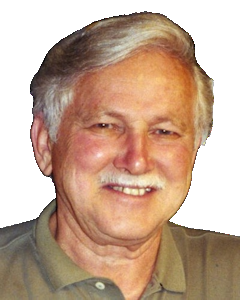
Q. And then you're moving north at this time. Heading towards the Huertgen forest.
Steve: Well, after they relieved us again, we got on trucks and we were going north. We didn't know where, but we figured it was Germany. So we got on trucks and got into, I'm not sure what town it was. It's hard to distinguish one from another. We went through a town and a lot of mud, rubble, houses torn down, blown up. That's where we went.
So we got off the trucks and we started to walk. I'm not sure how far we walked, but it seemed like 20 or 30 miles. It was already getting kind of dusk. So we're walking. It was a forest. It had to be part of the Huertgen Forest. So we were walking and we were going into the position at that time, which I knew now, but we didn't know at that time. Going into position, relieving the American troops that were already dug in, in the forest.
So we went in there and we replaced these people. They were members of the 28th Division. See, there's a little bit of confusion with people that aren't familiar with the makeup of the American Army. I was in the 8th Infantry Division with the 28th Regiment, but this was the 28th Division. So we relieved them. Already foxholes dug. It was sort of a quiet exchange. It was dark. These guys kept saying, good luck, good luck, good luck. I wonder what they were talking about. So the next day we woke up in this forest and all these trees blown up and broken up and everything.
Q. And then, Steve, I want to just stop you right there to put it in context again. We're talking now September, probably 1944, and you're actually in the western part of the Hurtgen Forest.
Steve: Yes.
Q. And just to set the stage, the Hurtgen Forest, it's west of the Roer River. Well, it actually almost encompasses the river, and it's about 50 square miles Steve of forest.
Steve: Yes.
Q. And just a hellhole, excuse my language, of thick trees, about 80 feet tall, one after the other. You can't even see ahead of you.
Steve: No, you couldn't.
Q. No field of fire, low-hanging branches, and the weather, Steve, right now is starting to turn rainy, cold.
Steve: Miserable.
Q. And you're dug in in this foxhole.
Steve: Right alongside the Kall Trail. The Kall Trail trail was nothing more but a logging road to haul logs up and down the hill.
Q. And the Hurtgen Forest is named after the town of Hurtgen, which is...
I'm going to just take a minute and show the little map you have here, just to give an idea again.
And, Steve, you didn't... where the arrow is here, you moved further. You moved there later. You moved further to the east.
Steve: No, that was about it.
Q. You were already kind of settled in there. That's right in here. And the town of Schmidt is here. And you were very near this town of Vossenack, which later is the town you went back and visited later on in the 1980s. I'm going to just let you go ahead and talk now about this whole conflict and the fighting in the Huertgen Forest. October, and you're going to be in and around Vossenack and that area until January 1945. See, when you talk about it, talk about your typical day, how it would go, and particularly for everybody, the hell you went through there, the exhaustion, the fact that hot metal and trees are falling on you from German artillery, the ammunition, the cold, the rain, frostbite. And you really have no field of fire to work with, taking casualties yourself. And was this the time when your assistant was killed?
Steve: No, it was later on.
Q. Okay, go ahead and just talk about that.
Steve: You almost covered it all, fully. Anyhow, the towns, the forest, the Hürtgen Forest was a hellhole. Let's be truthful about it. It was a hellhole, and the top brass in the Army thought they'll go through. They'll be leapfrogging like they were going through the plains of France. They thought they could break through. That's where they got into the forest, Gangho, and we're going to do this and do that. Well, they started out with one division. A division is approximately 15,000 men. They started out with one division and ended up with nine divisions to take that forest. That's how bad it was. We had, and the Germans, we had probably a total of 40,000 to 50,000 casualties, killed, wounded, missing in action.
When we were fired upon, most of the time there was tree bursts. Shells coming and hitting the top of trees and being exploded, and all the shrapnel going straight down. Ordinarily, when you get shelled, you lay flat on the ground so you don't get hit by shrapnel.
Well, like in the forest, if you lay down, your whole body was exposed to injury done by shrapnel. So if you're caught in a forest where you got shelled, we probably always prayed we never would, but we did. You'd stand up against the trunk of a tree so you'd expose as little of your body as you could.
Our ammunition was brought up by a vehicle called a Weasel, W-E-A-Z-E-L.
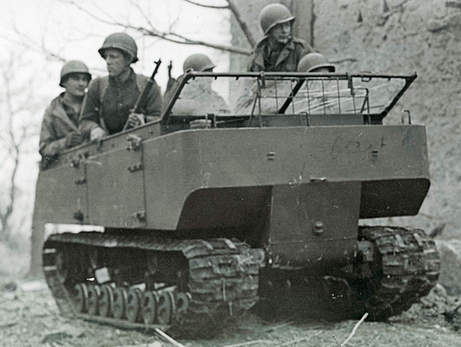
It was American. It had tracks on it, a small vehicle. Brought up our ammunition and food. We had to walk about a mile and a half to the area where this vehicle came in to unload the food and ammunition. Then we had to carry it back to our own company area. That was every night and every night. I'm sure the Germans at that time knew what we were doing so they would try to control their firepower for us to be in a certain place. But it was scary, very scary.
There was talk at one time that the Germans were so close to us that their machine gun nest was right alongside one of the paths that we walked on to get our ammunition and food. We never saw them, but that was the talk. You know how the Army is, there's a lot of rumors.
Q. The fir trees there, Steve, we're talking 80, 85 feet tall?
Steve: I call them Christmas trees. It was years and years before I, every time I smelled of a Christmas tree, I thought of the forest. It was years, years had to gone by.
Q. And we're in now to the fall, October, and the rains start to come, the mud.
Steve: The mud, the snow, the cold.
Q. That started in early in the winter then, or in October, November, right around?
Steve: Around the end of November, first part of December.
Q. Were you pretty much in the same foxhole for a long time?
Steve: Yes.
Q. Were you dug in with your assistant?
Steve: Well, sometimes we moved a little bit from it, but me and my assistant, yes.
Q. And then every day you're in combat, you're shooting the machine gun?
Steve: Oh, yes.
Q. And taking fire yourself?
Steve: To our left flank, there was a German dugout controlled by German machine guns. And if you moved, well, they would fire upon you. And we just didn't move during the day. Although one day in particular, we were out in a foxhole, and down off the Kall trail. It's a steep hill. And the road was bulldozed out to be accessible to any kind of traffic. So right as we're going down into the hill, crossing the Kall trail, we're sitting there at BS, and here all of a sudden we see a German stick his head up. And by the time we could move to fire, well, he was already slid back down into the hill. Then, of course, we got some fire after that. When I say fire, we were fired upon.
We did as much as we could to make it comfortable in our foxhole.
We tried to get some logs and cut them up and make roofs out of them and make bunkers.
Q. And your company and regiment has taken a lot of casualties, of course, all around you.
Steve: Yes, we did.
Q. And then, Steve, how did you handle sleeping? How did that work? Did you try to take catnaps during the daytime?
Steve: You tried, but at nighttime you slept two hours on and two hours off. And while you were on guard, your buddy was laid down to try to sleep.
While you're out there, you're watching every bush that you saw look like it was moving, and that was always frightening.
Q. And tanks couldn't operate up there. It was too cluttered and everything.
Steve: They couldn't operate in there.
Q. You must have been, after a period of time, just filthy.
Steve: You couldn't keep clean.
I got a two-day pass to go up to Clervaux, part of Luxembourg. It was a resort for the Europeans. And I went there and tried to wash myself.
They had an American bathing outfit. They gave us hot water to wash in and everything else.
Q. There's a good example of a foxhole with a little protection of somebody like Steve with an M-30 machine gun and a tripod and his assistant that'll funnel the ammunition through for him.
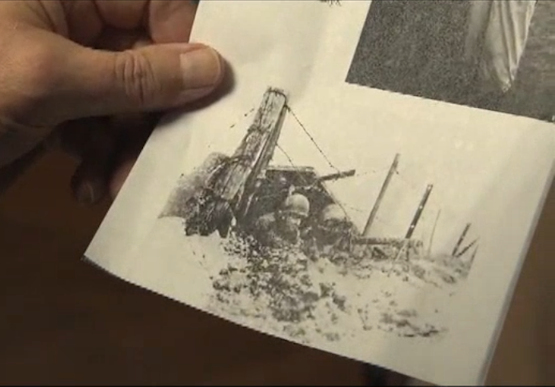
Here's a good picture of the forest, a little bit of the roads.
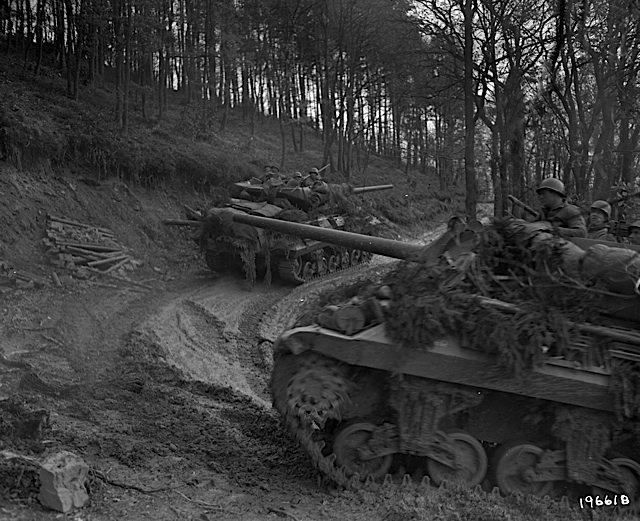
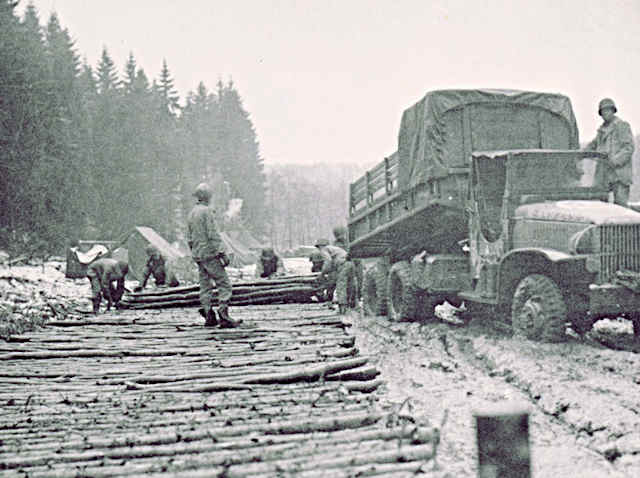
You can see the tall timbers, the mud, the trucks getting bogged down, the narrow turns in that road.
And then I don't know, Scott, if you can catch the expression on that German's face just to show the brutality of this campaign.
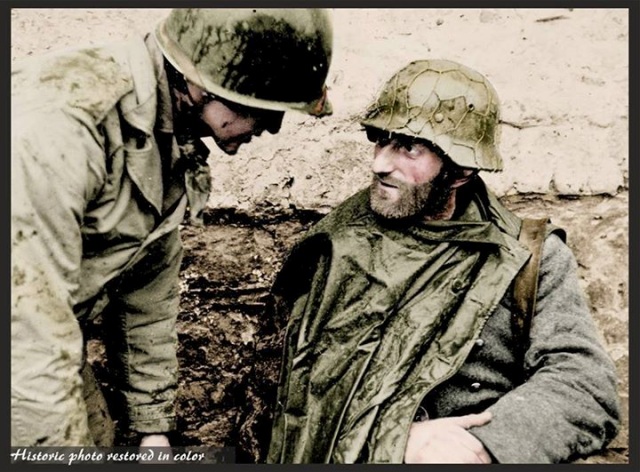
Some more soldiers dug in. There's a radio operator and a little hooch.
So, Steve, now let's say this is right around Thanksgiving in 1944, cold, rainy, snowy, terrible conditions, and talk a little bit about the casualties you're seeing and walk us up through Christmas if you can and the brutal cold and the morale and everything. Was anybody breaking at all or did you notice any story?
Steve: We had a buck sergeant. We saw some Germans approaching us, and he panicked and he ran.
Whatever happened to him after that, I'm not sure whether the medics took him back to the hospital or whether he was court-martialed, but I don't think he would.
Speaking of Thanksgiving, President Roosevelt said: Every G.I. will have turkey on Thanksgiving. Well, it's laughable now, but it wasn't then. Thanksgiving Day, we had K-rations. The day after Thanksgiving, we had cold turkey sandwiches. That was our Thanksgiving dinner. I thought of Thanksgiving prior to that. I was in Oklahoma. All the food you wanted to eat, the trim is everything.
Q. Did anybody you know come down with frostbite?
Steve: Not in my outfit. In other outfits. I didn't. In fact, one guy was from Trenum, and he had frostbite.
He was sent back to the hospital for transport.
Q. Did you take any POWs that you know of?
Steve: That's a funny thing you mentioned, because we moved from one location to another location in the forest. There was a patrol came back with a couple of young German soldiers. I mean young. The one kept looking. This was about 5 o'clock in the morning. The moon was up. This one young German soldier was looking, staring at me. I know he figured if he got loose, he would have killed me. It was scary. A young fellow. But he was captured.
Q. You're still pretty much in and around Vossenack, in that same area.
Steve: Basically the same.
Q. Move up now to Christmastime. How did that go?
Steve: We were still in the forest at Christmastime. At Christmastime, I was away from home. We were in a hole. When I say hole, foxhole. We were being shelled. As we were being shelled, I don't know how it happened, but it happened we got a mail call. I got a package from whom? From my mom. She gave me, sent me everything that we ate for Christmas Eve. The nut rolls. A little bit of the sauerkraut soup that we made. She put it in a jar. We didn't have plastic then. A little bit of honey we put over on our foreheads. This was all on Christmas Eve. I started to cry. Second year, I wasn't home. Then I started to cry.
Q. Moving now up to New Year's, is it going to be time soon for your assistant to get hit?
Steve: Not for another month.
Q. Take us up through that, through New Year's.
Steve: Christmas Eve, I remember Christmas, like I just mentioned about the food. Christmas Day, I don't recall whatever happened on Christmas Day. They can give me a million dollars and I couldn't remember.
Q. You had a chaplain in there that you could go to services from time to time.
Steve: Sometimes, sometimes. New Year's Eve, we never really did celebrate New Year's Day, so I didn't celebrate it there either. I don't know what happened New Year's Eve. I don't remember a thing about it.
Q. What's the temperature like now? What are we talking about, like in the teens?
Steve: It seemed colder than that since we were wet and the snow and everything seemed colder than that. I mean, it was cold. On record, they said that was the coldest winter on record.
Q. How deep was the snow?
Steve: If you had shoes like you have on or I have, we would be, our feet would be covered.
Q. So now we're into 1945 and go ahead on the...
Steve: 1945.
Q. January of 45.
Steve: Yes, we got on, we were transferred since the war and the forest was almost over with.
We got on trucks and they took us up to a town by the name of Niederau. It was across the river from the town of Düren, which we were supposed to cross the river and capture. It was at this point our machine gun section sergeant, he was hit and he went back to the hospital. My company commander and platoon leader called me aside and they said, Butko, you are the new machine gun section sergeant. I said, I don't want it. They said, what? You can't refuse. I said, I still don't want it. They asked me why. I said, I want to be concerned about my own safety and worry about everybody else. Well, they said, you recommend anybody? I said, yeah. Give it to Elmer Miller. He was my assistant gunner since July. Give it to him. So apparently they had asked him and he accepted.
This is a hard part for me.
Q. This is in January now, early, early 45?
Steve: Yes. He accepted. Two days later he was killed.
I always thought it could have been me instead of him. He would have been living today.
People don't know what it's like. They really don't know what it was like. I think even today they don't know.
They don't understand.
And, you know, we were crossing the river on barges. The rumor was that the Navy's operating the barges, landing craft for us to go across the river. The river was way above flood stage.
Q. This is the Roer?
Steve: The Roer River. It was above flood stage normally, but these dams up at Schmidt, that was our focal point in the force to capture Schmidt because there were three dams there that controlled the water in the Roer River. But at that time nobody thought about the dams. After we got Schmidt they said, now what? Get after the dams. Even the top brass never thought about it. So that's why the Roer River was way above flood stage.
We were going across the river, the Roer River, and there was a barge full of G.I.s all killed. Had a direct hit.
No, it's not pleasant. Not in the least bit.
Q. That was from an artillery or from German planes?
Steve: Artillery.
Q. So then did you come into the town of Schmidt?
Steve: No, this was already bypassed.
We crossed the Roer River. We were talking about the town of Düren, D-U-R-E-N, but actually the town we wanted to capture was adjacent to Düren called Niederau.
Q. I'm just for showing the camera again, we're over to the east of Schmidt now.
Steve: Schmidt.
Q. Yep, in this area here. So continue, see there.
Steve: The town is called Schmidt.
And we crossed the river at Niederau, which is adjacent to Düren. There are photos that show the Germans were trenched in like in World War I in trenches.
Well, we found the trenches, but there weren't any Germans in them.
We walked through this town, and we came to a hill with a road.
We start walking up toward another town. We got close to the town, and it was already dark, so we were getting dug in.
So we dug in, and one of the officers hollered, and sent him back to the area, rear area. That was a German soldier. He gave himself up.
He seemed, well, I was 19 then. Anybody over 19 was old, but he was an older person. He gave up, and we sent him back to the rear.
Next day we were ready for attack. This was all before 7 o'clock, and there was a lot of firepower. I mean, you wouldn't believe it.
And the talk was that was the first infantry division on our right flank. So we went into this town, into one town. There were some G.I.s around a wall of them.
Must have been some yard. This G.I., he was killed. The whole back, his back was all blown away. You could see everything in there. He was, of course, he was killed. And there was a German tank, half a mile or so away, and we could see him turning his turret toward us.
Of course, we took off and we hid someplace so he wouldn't see where we were. So he was aiming toward us. And between Duren and the Rhine River, we did a lot of leapfrogging.
We'd capture one town, and another outfit would capture the next town. That's just the way we went, so on and so forth.
Got into one town by the name of Modrath, M-O-D-R-A-T-H. We came into the back way into the town. There was a mine, limestone or something like that. That's where we came from the rear of the town. Well, there were some civilians there, but for the most part, it was all vacated. So we walked through the town, came to a railroad siding, and we followed that along some secondary road. It must have been a railroad siding, a freight yard or something. So we stopped, looking around. So up in the field there to our left, there was a German tank. You could hear him running his motor, his engine. We saw him aiming his gun toward us, and there was a series of boxcars on a siding. About four or five of us, we were all going to hide behind the wheels of the car. You know, still, we thought that would be safe. Well, these three or four GIs, that's where they hid. There was a little ditch alongside of that, oh, about eight or ten feet away. I decided to go in there instead of behind the railroad cars. That's where I went. Next thing, the tank fired, and every one of those guys were killed.
So that's a couple times that I've been saved.

In remembrance of Stephen J. Butko
May 25, 1925 - † June 21, 2015
